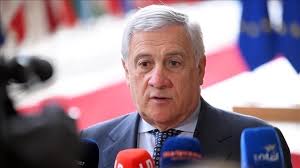Italy aims to be the driving force of integration, Tajani: The Balkans must enter the EU before 2030

Rome: Representatives of the 27 member states of the European Union, European institutions, candidate countries and potential candidates for membership have gathered in Taormina and Messina, Italy, on the seventieth anniversary of the historic Messina Conference of 1955 (a meeting of the 6 member states of the European Coal and Steel Community that is considered the starting point of the integration process).
At this meeting, Italy, according to the “Nova” agency, has restarted its goal of becoming a driver of integration, thus conveying clear messages regarding EU expansion to the Western Balkan countries, but also to Ukraine and Moldova.
Italian Foreign Minister Antonio Tajani defined Italy’s message as a “strong message to all candidate countries to join the European Union”, reiterating that “accelerating the reunification process is a priority” for Italy.
Tajani has mentioned Albania, Serbia, North Macedonia, Bosnia and Herzegovina, Montenegro and Kosovo as the main beneficiaries.
“To celebrate the 70th anniversary of the Messina and Taormina Conference, we have also invited Moldova and Ukraine precisely to give a signal of great attention to these countries.”
In the roadmap, the hope is concrete: the Western Balkans should join “before 2030.” “The previous President of the European Council, Charles Michel, mentioned 2030. I would like to bring forward 2030 for the Western Balkan countries, and then we will talk about Moldova and Ukraine, which are two other candidate countries and it is right that they be part of our Union,” Tajani said.
He recalled that “there are countries like Albania and Montenegro that have made very important steps forward.”
The Italian Minister of Foreign Affairs added that listening today to the words of representatives “of many of these countries”, their goal is “to do everything possible to join the European Union in a short time”.
“They have made a political choice, it is right to support them and do everything that, as Italy, is in our power to help them,” the minister added.
The meeting was not just about the EU, “Nova” further writes.
The conference was an opportunity to address the Middle East crisis, aggravated by an escalation between Iran and Israel that is causing growing concern.
Tajani confirmed that the ambassadors “will remain there as long as there are Italians to help,” referring to conversations he had with the heads of missions in Tehran and Tel Aviv, Paola Amadei and Luca Ferrari, respectively.
Italy is also working on charter flights, “the first ones probably departing from Egypt, with citizens on board” in order to help compatriots “leave Israeli territory,” Tajani explained.
He specified that it is not about “evacuations, but about assistance and coordination.”
The message coming from Italian diplomacy is of a continuous and operational presence, especially in those countries with compatriots to help, in a complex geopolitical context.
While considering the situation as “worrying in general”, Tajani stressed that “there is no immediate danger to our soldiers” deployed in the area and clarified that at the moment there is no “news about American military bases in Italy involved” in the escalation involving Iran and Israel, even if “we do not know what the United States will want to do”.
These words come after several reports by the London-based Iranian opposition broadcaster “Iran International”, according to which Prime Minister Giorgia Meloni discussed yesterday the possibility of the United States using military bases in Italy to attack Iran, during meetings with senior intelligence officials and commanders of the Italian Armed Forces.
The Messina-Taormina conference offered an attempt to relaunch the European project – with Italy at the forefront of calls for a wider, stronger and more cohesive Europe – and at the same time concrete diplomatic action for the management of international crises, Nova further writes.
Furthermore, this agency, citing parts of the Messina and Taormina Declaration, states that “the process of internal reform of the European Union must be carried out separately, but in parallel with the enlargement process.”
The EU, the text continues, will thus be ready “to effectively complete a merit-based enlargement, as a geopolitical advantage and a strategic investment in peace, security and prosperity for the entire continent”, in a spirit of “solidarity, mutual trust and open and transparent cooperation”.





